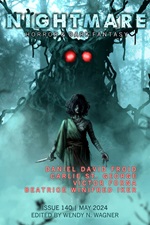“An Offering from the Void” by Daniel David Froid
“Solve This One, Mrs. Miller” by Carlie St. George
“like blood on the mouths of death” by Victor Forna
Reviewed by Victoria Silverwolf
Three tales of terror with very different moods and structures appear in this issue.
“An Offering from the Void” by Daniel David Froid takes the form of an introduction to an imaginary reprinted book by its publisher. The publisher explains how the original edition of the book was discovered at an estate sale after the deaths of its author and her husband. The book deals with a cursed stone, said to be inhabited by an evil entity who brings doom to whoever possesses it. The stone seemed to appear and disappear during the publisher’s investigations.
This is an example of quiet horror, with the mood of an old-fashioned Gothic chiller. All of its terrors are implied and offstage. The story is open-ended, leaving the publisher’s fate to the reader’s imagination. It will best be appreciated by those who enjoy very subtle frights, although some readers may find the ambiguous conclusion anticlimactic.
An introductory note from the author explains that “Solve This One, Mrs. Miller” by Carlie St. George is inspired by logic puzzles. Following characters who are described by their roles, actions, or possessions, as in such puzzles, the reader discovers that several junior high school students have been murdered, and eventually learns the identity of the killer.
Despite the unusual structure, this is not really a puzzle or a whodunit. Narrated in a more traditional way, this would be something like a very brief outline for a slasher movie. Fans of that genre may find that the offbeat way of telling the story adds some novelty to a familiar plot.
As a young boy, the narrator of “like blood on the mouths of death” by Victor Forna witnesses strange creatures slowly devour parts of his mother’s body. She continues to care for him even after her head is gone. In alternating sections of text, the narrator is a grown man, being eaten in the same way and caring for his family in a similar fashion.
An interview with the author makes it clear that the surrealistic premise is a metaphor for losing a parent to a lingering terminal disease. As such, the story has emotional power. Some readers may find that the mother’s continuing presence as a caregiver, even when she is no more than a pair of hands, too grotesque or even ludicrous.
Victoria Silverwolf thinks it odd that a horror magazine should have content warnings for violence and death.
 Nightmare
Nightmare